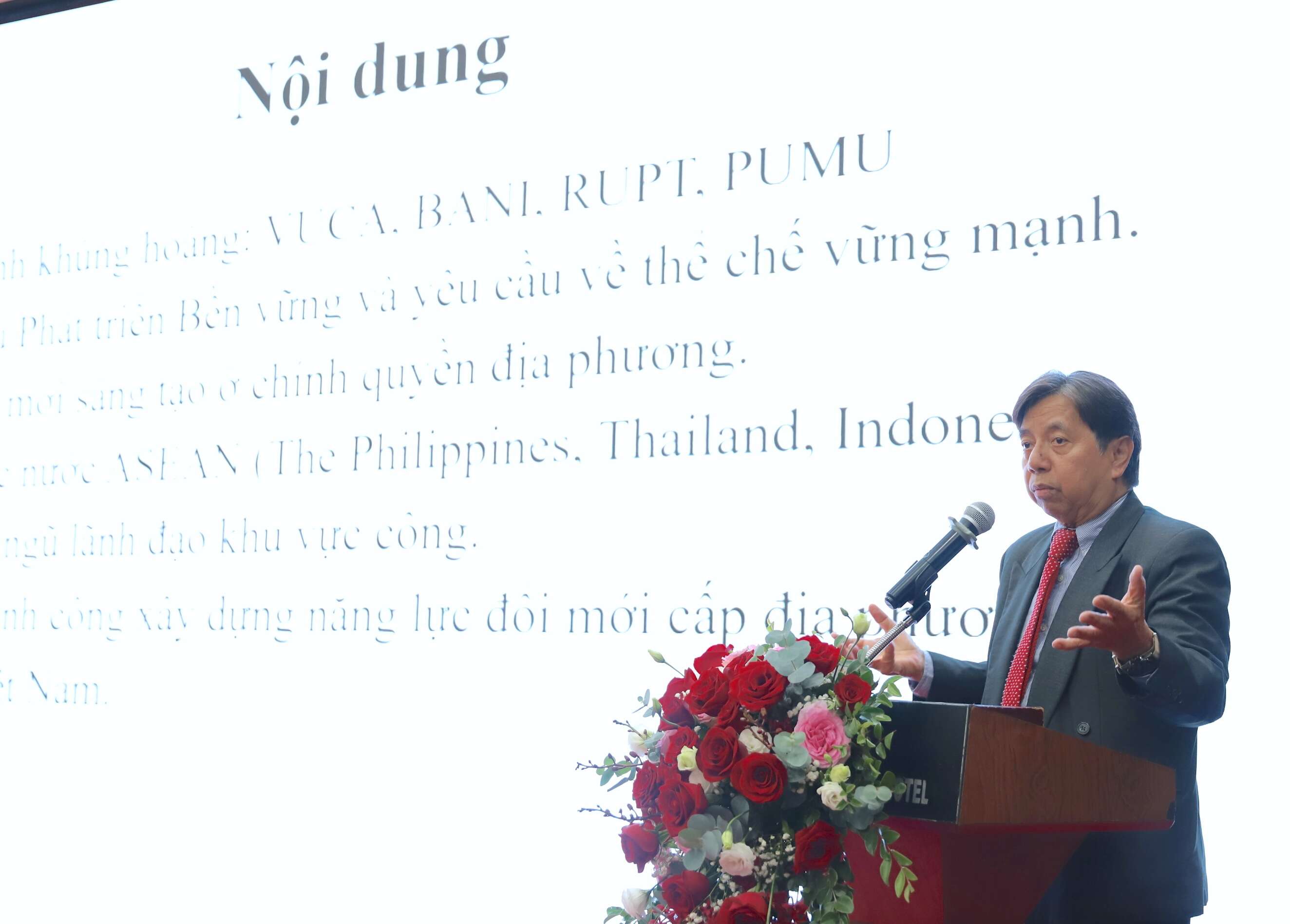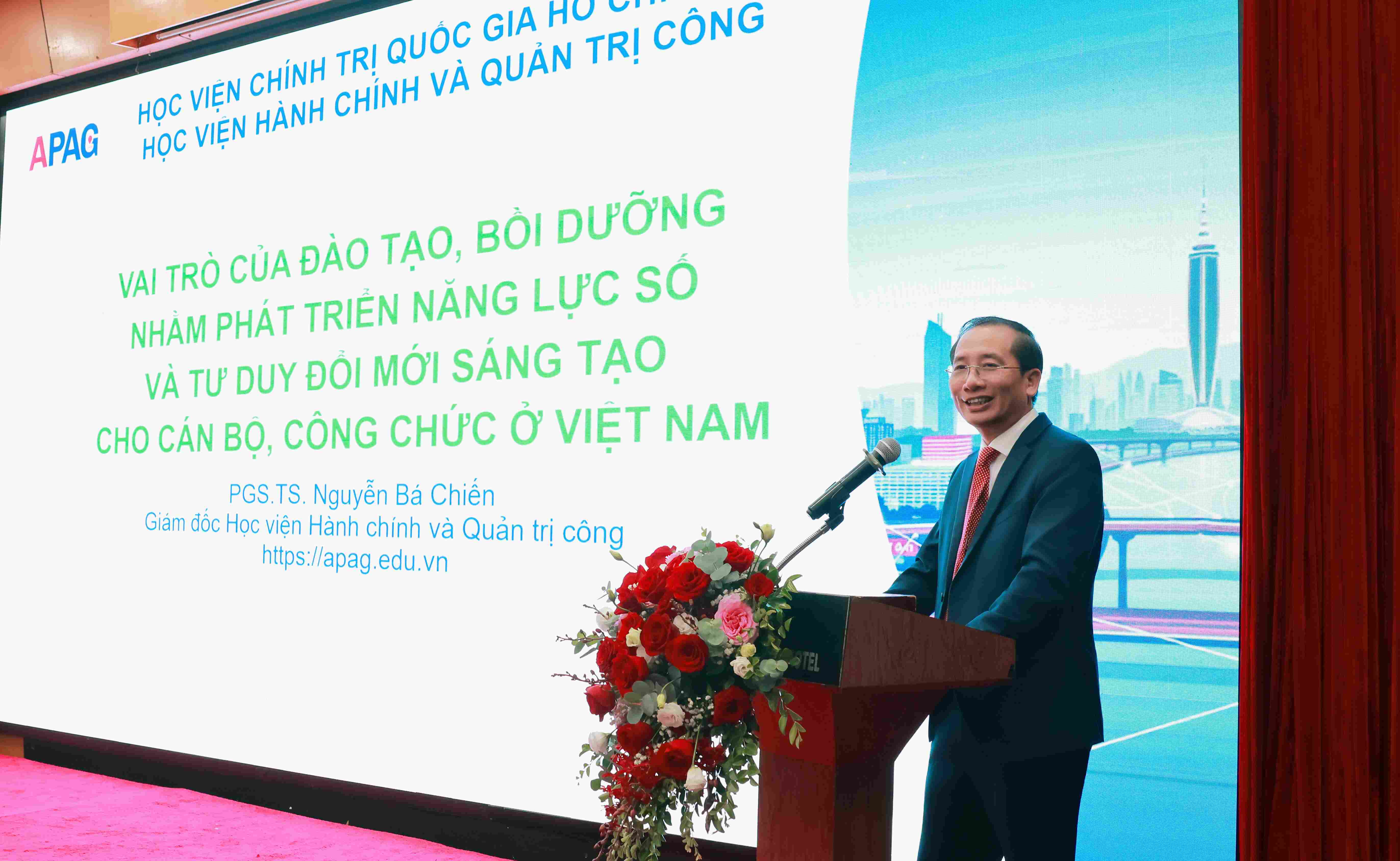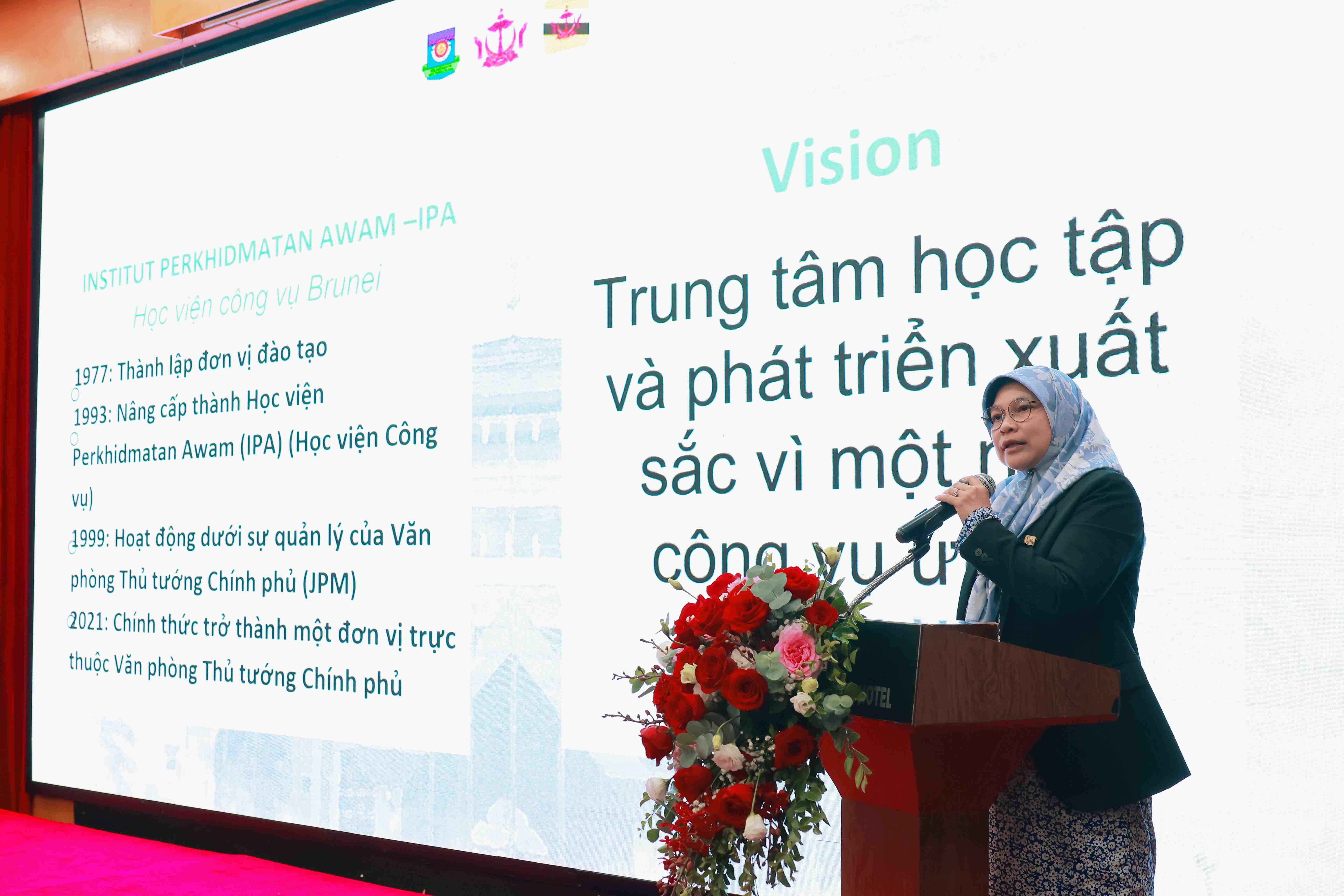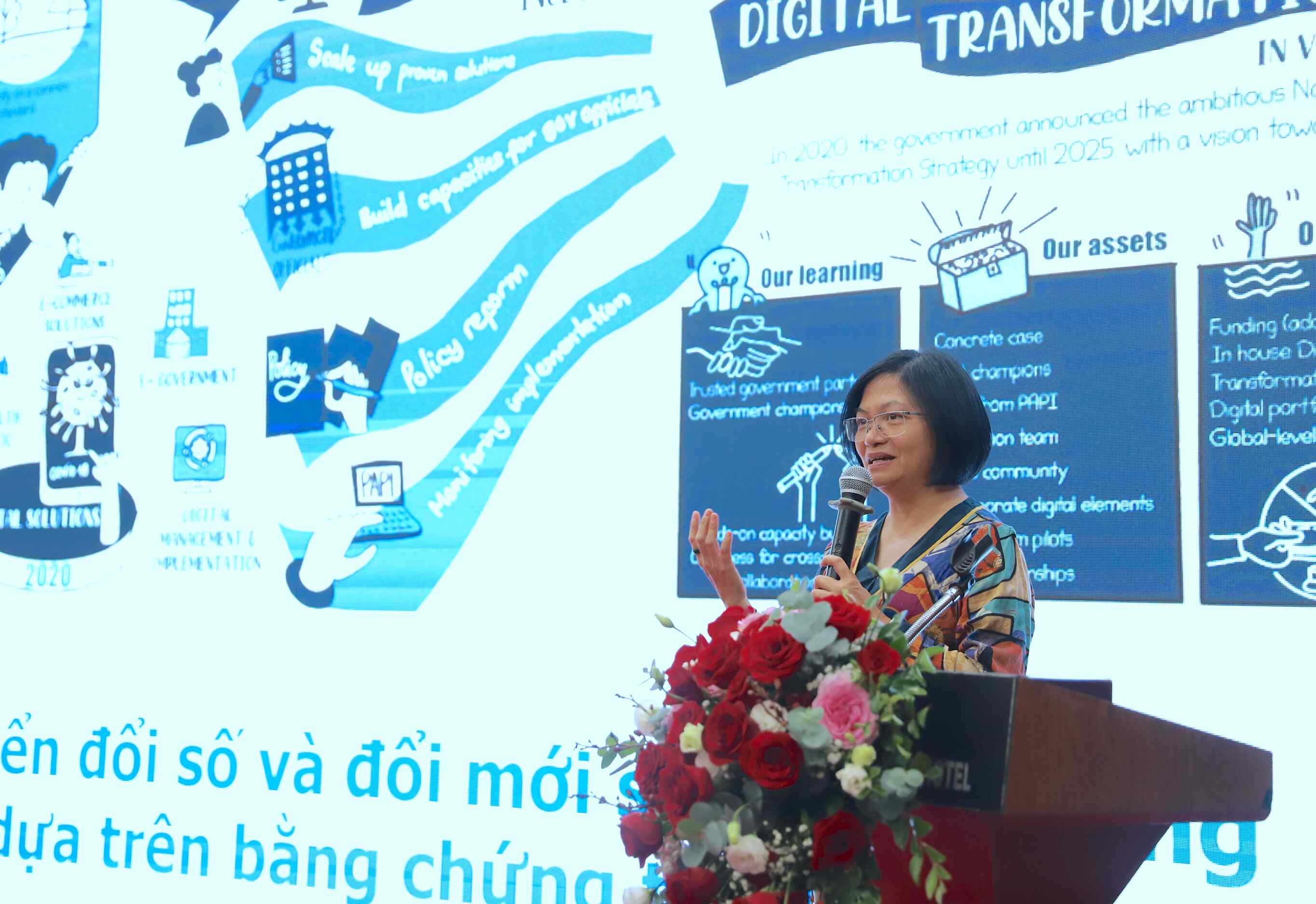Continuing the program of the 2025 Annual International Forum on Public Governance, participants attended Session 3: Strengthening the link between educational institutions and local governments in innovation on the afternoon of October 24, 2025.

The session was chaired by Prof. Dr. Alex Brillantes Jr., Secretary-General of EROPA; Dr. Bui Phuong Dinh, Vice President of the Academy of Public Administration and Governance (APAG); and Assoc. Prof. Dr. Hoang Mai, Dean of the Faculty of Human Resources Management, APAG. The session featured several insightful presentations and discussions.
 Prof. Dr. Alex Brillantes Jr., Secretary-General of EROPA.
Prof. Dr. Alex Brillantes Jr., Secretary-General of EROPA.Prof. Dr. Alex Brillantes Jr., Secretary-General of EROPA, shared experiences from ASEAN countries such as the Philippines, Thailand, Indonesia, and Brunei in developing innovation capacity within the public sector. He emphasized that innovation in the public sector is not limited to technological application, but also involves institutional, managerial, and cultural transformation aimed at building efficient, transparent, and citizen-centered governments. Several countries have implemented successful models and programs to enhance public sector innovation capacity, such as: The Galing Pook Program (Philippines), which has recognized 357 outstanding local governance innovations; The “Smart Kampung” model (Indonesia), promoting rural digital transformation; The “Jakarta Kini” initiative, providing a one-stop online public service platform; Brunei’s community-based tourism model, which integrates economic development with cultural preservation. These examples demonstrate that sustainable innovation requires citizen participation, cross-sectoral collaboration, and support from academic and business communities. For Viet Nam, Prof. Dr. Alex Brillantes Jr. proposed three policy directions: (1) Strengthening collaboration between universities and public agencies to co-create innovative public solutions; (2) Investing in leadership and civil service innovation capacity through programs on systems thinking and creative design; (3) Leveraging digital transformation and artificial intelligence as strategic advantages to enhance public governance capacity, aiming toward an effective, innovative, and citizen-oriented administration.
 Assoc. Prof. Dr. Nguyen Ba Chien, President of APAG, Chair of EROPA Executive Council.
Assoc. Prof. Dr. Nguyen Ba Chien, President of APAG, Chair of EROPA Executive Council.
Assoc. Prof. Dr. Nguyen Ba Chien, President of APAG, Chair of EROPA Executive Council, highlighted the importance of training in developing digital competency and creative thinking for Viet Nam’s public servants. He noted that digital competency enables public servants to master information technology, big data, artificial intelligence, and digital platforms, thereby improving public management and service delivery. Enhancing digital capacity helps shorten administrative processing times, increase transparency, and improve operational efficiency. He further emphasized that creative thinking empowers public servants to proactively design innovative solutions, optimize processes, and improve service quality. Training programs on systems thinking, design thinking, and innovation management encourage public servants to be more flexible, holistic, dynamic, and creative in addressing administrative challenges.
 Dr. Noor Maya Salleh, Director, Institut Perkhidmatan Awam (Brunei).
Dr. Noor Maya Salleh, Director, Institut Perkhidmatan Awam (Brunei).
In her presentation titled “Leadership for innovation in the era of globalization and technological revolution,” Dr. Noor Maya Salleh emphasized that innovation in the public sector is an imperative task to enhance efficiency and strengthen public trust. She noted that governments must develop visionary leaders with adaptability, digital thinking, and strategic foresight, while building a flexible human resource development (HRD) ecosystem that connects the state, businesses, academic institutions, and society. According to her, the success of public governance in a time of constant change depends on the capacity of leadership - their ability to anticipate complex global shifts, exercise strategic vision, and turn global challenges into opportunities for national sustainable development.
 Ms. Do Thanh Huyen, Policy Analyst and Programme Manager, UNDP Viet Nam.
Ms. Do Thanh Huyen, Policy Analyst and Programme Manager, UNDP Viet Nam.
Ms. Do Thanh Huyen shared evidence-based insights on promoting innovation and digital transformation in Viet Nam’s public sector. She highlighted the role of PAPI (the Provincial Governance and Public Administration Performance Index) as an essential data-driven tool that helps central and local governments improve governance quality, transparency, and accountability. She further asserted that public sector innovation can only be effective when grounded in data, evidence, and citizen participation, thereby advancing a comprehensive, transparent, and citizen-centered digital transformation in Viet Nam’s public governance.
Roundtable discussion: Building innovation capacity: The role of training institutions and local governments in the current context of Viet Nam
 Panelists participate in the Roundtable discussion.
Panelists participate in the Roundtable discussion.
The roundtable featured participation from international experts alongside representatives from local governments, enterprises, and training institutions, including: Dr. Bui Phuong Dinh, Vice President of APAG; Mr. Le Huu Phuoc, Deputy Chief of Office of the Provincial People’s Committee,
Director of the Provincial Public Administration Service Center of Quang Tri Province; Mr. Nguyen Duc Manh, Deputy Director, Provincial Public Administration Service Center of Tuyen Quang Province; Dr. Mac Quoc Anh, Vice Chairman, Ha Noi Association of Small and Medium Enterprises; Assoc. Prof. Dr. Pham Van Hong, Dean, School of Economics, Phenikaa University.
Under the theme “Building innovation capacity: The role of training institutions and local governments in the current context of Viet Nam”, the discussion revolved around several key issues:
First, to foster genuine innovation in the public sector, Viet Nam needs to develop core competencies including innovative leadership, digital and data literacy, systems thinking, and creative problem-solving. Innovative leadership helps set strategic direction, anticipate emerging trends, and create an enabling environment for creativity. At the same time, combining digital and data competencies with systems thinking allows civil servants to make effective, transparent, and context-appropriate decisions. Moreover, collaboration and co-creation among governments, enterprises, academic institutions, and citizens are essential to implementing sustainable initiatives and improving governance quality.
Second, a key to integrating innovation thinking into public service training is shifting the focus from knowledge transmission to the development of cognitive and creative problem-solving capacities. Training should blend theory with practical experience, encouraging learners to experiment, think critically, and co-create, thereby nurturing a culture of innovation within the civil service.
Third, partnerships among local governments, training institutions, and international organizations (such as UNDP) provide a crucial foundation for strengthening innovation capacity at the local level. Through training, knowledge sharing, and the replication of best practices, such collaboration can help establish local innovation ecosystems in which citizens serve as both the center and the driving force of development.
Fourth, training institutions and local governments should foster an environment that encourages experimentation and citizen-driven learning from real-world practices, while also providing support in skills, technology, and stakeholder connectivity. This enables local initiatives to evolve into scalable models. Sustaining and spreading this spirit helps shape a culture of innovation grounded in the needs and ideas of local communities.
Fifth, enterprises play a pivotal role in driving innovation pressure on local governments through demands for competitiveness, transparent investment environments, and efficient public services. Businesses also support governments by co-developing technological solutions, sharing expertise, data, and modern management practices. This interaction pushes local administrations to become more agile, creative, and proactive in serving citizens and enterprises.
Sixth, the Academy of Public Administration and Governance identifies building officials' and civil servants' innovation capacity as a key mission to enhance governance effectiveness and sustainable development. Through training programs in creative thinking, systems thinking, and the application of digital technology, APAG fosters a collaborative, co-creative learning environment, empowering civil servants to innovate and better serve the people and society.
Seventh, universities play a critical role in developing innovation capacity among students - the future workforce, including future public servants. By linking education, research, and practical application, universities help students build critical thinking, systems thinking, and creative problem-solving skills. A learning environment that encourages collaboration, co-creation, and adaptability equips students to contribute effectively to public governance and citizen service. The most important lesson for cultivating an innovation culture is to focus on people - encouraging a spirit of learning, experimentation, and risk-taking. Innovation culture thrives only when individuals and organizations are free to create, test new ideas, and learn from failure. Furthermore, collaboration, knowledge sharing, and co-creation among schools, communities, and stakeholders are key to making innovation a habit and shared value across organizations and local communities.